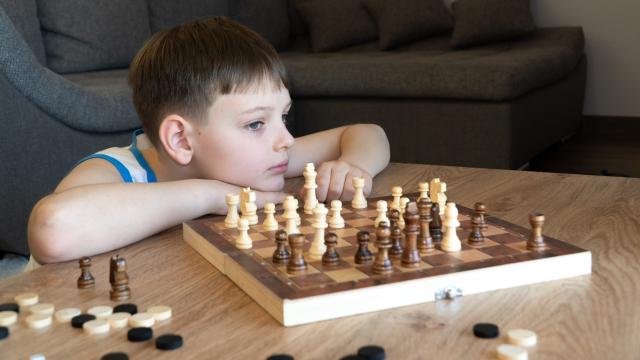My 10-year-old has many wonderful qualities. He’s funny, generous, and curious about the world. He does not, however, like to lose a game. And to be fair, that’s not all that unusual. I think, given the choice, most of us would prefer to win any game we play — otherwise, what is the point of keeping score? But it’s something we’ve had to work on over the years in my home, and I’ve learned a few tricks along the way.
Start with cooperative games
The point of keeping score is to figure out who has won the game, but winning really isn’t the point of playing. Kids don’t start playing soccer when they’re six years old because they want to crush their opponent; they play because it’s fun. So before you start challenging them to a Candy Land duel, introduce them to cooperative games.
Preschoolers are a prime age to start playing cooperative games, which don’t pit you against them. Instead, you work together toward a common goal, while still getting all the benefits of practicing things like taking turns, following directions, and honing fine motor skills. A favourite in our home was Feed the Woozle, but other popular cooperative board games include Hoot Owl Hoot, Mermaid Island, and Race to the Treasure.
Teach them to play the long game
Something clicked with me recently when my son and I started playing a round of Skip-Bo and he was already bristling before he’d even finished his first turn. Whereas I know fortunes can swing widely and quickly in that game, he was treating every hand, I realised, as its own miniature game. Four bad hands in a row might as well have been four losses to him. No wonder this was no fun.
When I put it to him in those words — “try not to think of every turn as its own game, but as one piece of a much bigger puzzle” — it resonated with him in a way that “I don’t understand why you’re already getting upset; we just started playing” never did.
If it doesn’t resonate quickly with your kids, point out your own misfortunes as you play, so they can see how the game is playing out from both perspectives. You might say, “Oh wow, I was so far ahead of you before, and now you’re right on my tail!” or “I thought I was going to be able to catch you, but I think you’re too far ahead of me now!”
Young kids are often only seeing the game playing out from their perspective, and having you narrate some of your experience (particularly when you’re being a good sport about losing) can help them build empathy for their opponent. The goal is not to make them feel bad about winning, but to remind them that at any given time, if someone is winning, someone else is losing.
Be a gracious loser (and winner) yourself
Once, on a weekend trip with my husband and two good friends to a cabin in northern Arizona, someone accused me of something. The four of us were sitting around the cabin’s dining room table, drinking beers and playing a rousing game of Clue — as adults do — when one of my friends let it drop that he thought I was the most competitive one of our group.
Knowing this to be Patently False, I laid out a detailed argument of precisely how I was not the most competitive of the group (which is not at all a competitive thing to do). Since then, I have had to look deep within myself and admit there is a chance I have a slightly competitive nature, which mostly comes out when I play board games or flip cup (but only because I am very good at both). However, really wanting to win and acting shitty about winning or losing do not have to go hand, and this is a thing you should model for your kids.
Since my son was very young, we have a standing practice that when a game is complete, we shake hands and say, “Good game.” This has been a good way for him to watch me lose with a smile on my face — not necessarily happy to have lost, but happy to have played at all. It’s also a good way to practice and model gracious winning. There is to be no gloating.
Kids will, more than anything else, pick up on our cues for how to react when we lose a hand of Uno or, say, when your football team loses a big game (I’m a Browns fan, so…). If you let it ruin your day, they pick up on the fact that winning is important enough that losing means it should negatively affect your mood. Show them how to let the losses, both big and small, roll off your back as much as possible.
Put it away if you need to
Games are supposed to be fun, so if game night is ending in a mess of tears every time, it might be time to take a little break from gaming — or at least from the one game in particular that seems to frustrate them beyond reason (I’m looking at you, Monopoly Gamer). You can always try again once some time has passed, tensions have eased, and they’re ready to give it another shot.

Leave a Reply
You must be logged in to post a comment.